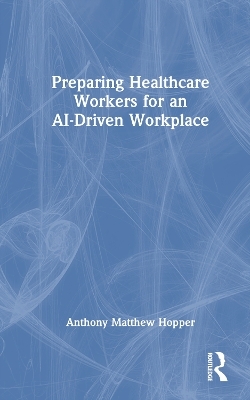
Preparing Healthcare Workers for an AI-Driven Workplace
Auerbach (Verlag)
978-1-032-59390-6 (ISBN)
A large number of healthcare employees, whether they are on the frontlines or in management, work in complex, fluid environments. They must perform a diverse number of sometimes intricate tasks on a daily basis as well as excel in handling ad hoc interactions with patients, residents, coworkers, or other stakeholders. In the coming years, these workers will also have to adjust to disruptions in their workplaces that are brought about by the introduction of new Artificial Intelligence (AI) systems and health information technologies (HITs) into their offices and clinics. Many of these workers will find themselves competing for jobs not only with other humans but also with machines.
Preparing Healthcare Workers for an AI-Driven Workplace helps healthcare professionals to develop their core critical thinking skills while also enabling them to develop methodologies for successfully completing complex projects by themselves, dealing with ad hoc interactions, and taking advantage of the coming AI- and IT-driven changes in their workplaces. The book begins with explaining why healthcare workers, whether they work on the frontlines or in management, need to be strong critical thinkers. It breaks down “critical thinking” into its key elements and provides methods that readers can use to help them to master critical thinking and grow to become elite critical thinkers. The book also provides tips on how to handle ad hoc conversations with supervisors, coworkers, patients, residents, and other stakeholders. Examining how AI- and IT-related developments will transform the healthcare ecosystem in the coming years, the book identifies key mindsets and strategies for thriving in technologically rich healthcare environments.
Anthony Matthew Hopper worked in the healthcare industry for over a decade and spent time with both small organizations and hospital systems. He held several different positions at these companies, including analyst and frontline management-related jobs. He also has experience in health policy via an internship with the Center for Studying Health System Change. For the last decade, Anthony has worked at ECPI University’s Emerywood campus, located in Richmond, Virginia. He has taught a variety of college-level classes and has on occasion helped the institution to design new courses, to identify and secure internship sites, and to locate potential employment opportunities for graduates of ECPI’s healthcare administration program.
1. Key Factors That Will Impact Healthcare Workers in the Coming Years 2. Breaking Down “Critical Thinking” into Its Key Elements 3. Training Employees to Master the First Three Aspects 4. Mastering the Final Two Critical Thinking–Related Aspects 5. Creating Alter Egos: A Key to Becoming an Elite Critical Thinker 6. Savvy Healthcare Employees: Deftly Managing Impromptu Conversations 7. How to Remain Relevant in an AI- and IT-Driven Business Environment 8. Conclusion References Glossary
| Erscheinungsdatum | 19.04.2024 |
|---|---|
| Verlagsort | London |
| Sprache | englisch |
| Maße | 138 x 216 mm |
| Gewicht | 458 g |
| Themenwelt | Mathematik / Informatik ► Informatik ► Netzwerke |
| Mathematik / Informatik ► Informatik ► Theorie / Studium | |
| Informatik ► Weitere Themen ► Bioinformatik | |
| Medizin / Pharmazie ► Gesundheitswesen | |
| Medizin / Pharmazie ► Pflege ► Ausbildung / Prüfung | |
| Wirtschaft ► Volkswirtschaftslehre | |
| ISBN-10 | 1-032-59390-3 / 1032593903 |
| ISBN-13 | 978-1-032-59390-6 / 9781032593906 |
| Zustand | Neuware |
| Informationen gemäß Produktsicherheitsverordnung (GPSR) | |
| Haben Sie eine Frage zum Produkt? |
aus dem Bereich


